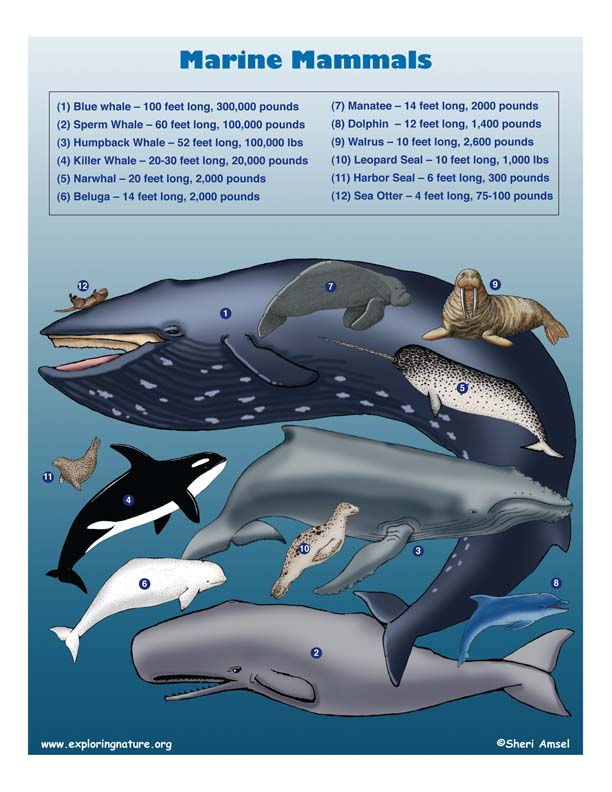

Marine mammals include whales, dolphins, porpoises, manatees, dugongs, seals, sea lions, fur seals, walruses and otters. Even polar bears are sometimes considered marine mammals because they depend on the ocean for their seal diet. Marine mammals come in all shapes and sizes – from the massive blue whale to the small sea otter. Some, like whales and dolphins, have no body hair. This adaptation helps them move quickly through water. They make up for the lack of warm fur by having blubber to help them stay warm in cold ocean waters. Like all mammals, they breathe air through lungs, are warm-blooded, give birth to live young and feed them on milk.
Like mammals on land, marine mammals have a varied diet. Dolphins travel throughout the open ocean eating fish, squid and crabs, while walruses live on rocky arctic coasts eating shellfish, clams and mussels and leopard seals in Antarctica eat penguins. Manatees are the only vegetarian marine mammal grazing on plants along warm coastlines. Blue whales, the largest marine mammal (and largest animal on Earth), eat one of the smallest prey – tiny shrimp-like krill, filtered from the water through baleen plates instead of teeth. Whales and dolphins are considered some of the most intelligent animals on Earth. Their curiosity, intelligence, and grace in the water have fascinated people worldwide.
Though they are protected by the 1972 Marine Mammal Act, many marine mammals are endangered from over hunting, pollution, and habitat loss.
_____________________________________________________________________________________________________________
Related Activity:
Seals and Sea Lions Coloring Page
Whales and Dolphins Coloring Page (Cetacea)
Related Testing and Assessment:
Marine Mammals - Multiple Choice Test
Whales and Dolphins Labeling Page
_____________________________________________________________________________________________________________
When you research information you must cite the reference. Citing for websites is different from citing from books, magazines and periodicals. The style of citing shown here is from the MLA Style Citations (Modern Language Association).
When citing a WEBSITE the general format is as follows.
Author Last Name, First Name(s). "Title: Subtitle of Part of Web Page, if appropriate." Title: Subtitle: Section of Page if appropriate. Sponsoring/Publishing Agency, If Given. Additional significant descriptive information. Date of Electronic Publication or other Date, such as Last Updated. Day Month Year of access < URL >.
Amsel, Sheri. "Ocean Mammals" Exploring Nature Educational Resource ©2005-2024. December 13, 2024
< http://www.exploringnature.org/db/view/1734 >
